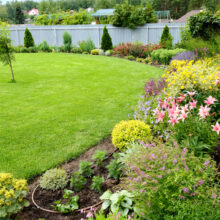 Gardening is not just a hobby; it’s a therapeutic and rewarding experience that allows you to connect with nature and nurture beautiful blooms or delicious produce. Whether you’re a seasoned gardener or just starting, there are always ways to enhance your gardening skills and reap greater rewards from your efforts. In this blog post, we’ll explore ten expert tips to help you get the most out of your garden.
Gardening is not just a hobby; it’s a therapeutic and rewarding experience that allows you to connect with nature and nurture beautiful blooms or delicious produce. Whether you’re a seasoned gardener or just starting, there are always ways to enhance your gardening skills and reap greater rewards from your efforts. In this blog post, we’ll explore ten expert tips to help you get the most out of your garden.
1. Plan Your Garden Layout
Before you put a single plant in the ground, take some time to plan your garden layout. Consider factors like sunlight, soil quality, and water accessibility. Sketch out a rough design, including the placement of different plants, paths, and any garden structures like trellises or raised beds. A well-thought-out garden layout will help you make the most of your available space and resources.
2. Choose the Right Plants
Selecting the right plants for your garden is crucial. Consider your local climate and soil type when choosing flowers, vegetables, or shrubs. Native plants are often a great choice, as they’re well-suited to your area and require less maintenance. Make sure to pick a variety of plants that bloom or produce at different times of the year to ensure year-round interest in your garden.
3. Prepare Your Soil
Healthy soil is the foundation of a thriving garden. Test your soil to determine its pH and nutrient levels, then amend it as needed. Organic matter like compost and well-rotted manure can enrich the soil, promoting better growth and water retention. Regularly mulching your garden beds can also help maintain moisture and suppress weeds.
4. Water Wisely
Overwatering or underwatering can be detrimental to your garden. Invest in a soaker hose or a drip irrigation system to deliver water directly to the roots, reducing the risk of fungal diseases. Be mindful of when you water, too. Early morning is often the best time, as it allows the leaves to dry before evening, minimizing the chances of disease.
5. Maintain Proper Spacing
When planting, give your plants enough space to grow without crowding each other. Proper spacing allows for better air circulation, reducing the risk of mold or fungal issues. It also prevents competition for nutrients and sunlight, resulting in healthier, more robust plants.
6. Prune and Deadhead Regularly
Pruning and deadheading are essential gardening tasks that promote healthier plants and encourage continuous flowering. Remove dead or spent flowers to redirect the plant’s energy into producing new growth. Proper pruning can shape and rejuvenate your plants, ensuring they remain vigorous and vibrant.
7. Use Natural Pest Control
Chemical pesticides can have harmful effects on the environment and beneficial insects, such as bees and ladybugs. Instead, employ natural pest control methods, like planting companion plants that deter pests or introducing beneficial insects into your garden. Neem oil, garlic spray, and diatomaceous earth are also effective, non-toxic solutions to keep unwanted critters at bay.
8. Feed Your Plants
Plants require nourishment to thrive, and it’s essential to provide them with the right nutrients. Use a balanced, slow-release fertilizer that suits your specific plant’s needs, and apply it according to the manufacturer’s instructions. Be careful not to over-fertilize, as this can lead to excessive growth at the expense of flowers or fruits.
9. Create Microclimates
In larger gardens, creating microclimates can be a game-changer. A microclimate is a small, distinct area with specific environmental conditions that differ from the larger surrounding area. By carefully selecting and positioning plants, hardscape features like walls, or even placing containers strategically, you can manipulate factors like temperature, humidity, and sunlight, allowing you to grow a wider range of plants.
10. Embrace Sustainable Practices
Sustainable gardening practices are not only environmentally responsible but can also save you time and money in the long run. Implement techniques such as composting kitchen scraps and garden waste to reduce the need for chemical fertilizers. Consider rainwater harvesting to irrigate your garden, and opt for eco-friendly garden tools and materials whenever possible.
Conclusion
Gardening is a fulfilling endeavor that can provide beauty, fresh produce, and a sense of accomplishment. By following these ten expert tips, you can maximize the potential of your garden and enjoy a more successful and rewarding gardening experience. Remember that gardening is an ongoing learning process, so don’t be discouraged by initial setbacks. With time, dedication, and these valuable strategies, you’ll be well on your way to creating a flourishing and vibrant garden space. Happy gardening!
Got Questions? Let Us Help!
Since 1939, The Delicate Daisy – House of Flowers has been San Francisco’s premier locally owned and operated floral destination. Roxane Rockwell and her talented team have been crafting spectacular arrangements of fresh flowers and plants for all occasions and venues for over 31 years. From weddings, birthdays, and special events; to weekly corporate arrangements, local deliveries, and gourmet gift baskets, The Delicate Daisy – House of Flowers offers unparalleled experience, service, and quality. A landmark of the Richmond District of San Francisco, our charming retail space is open to the public, and is filled with beautiful flowers hand selected from the flower market three times a week by Roxane herself. Contact us today to learn more about what we can do for you!
